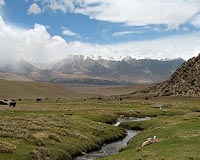 |
Paris, France (SPX) Oct 19, 2009 The Engineering Test Unit model of NIRSpec - the innovative and pioneering Near Infrared Spectrograph for the James Webb Space Telescope - has been completed by the prime contractor, EADS Astrium, and is ready to be shipped to NASA for testing. The James Webb Space Telescope (JWST) is a large (6.5 m), cold (<50 K), infrared-optimised telescope designed to address a number of key topics in modern astronomy, which include identifying the first stars and galaxies and, studying how they have evolved. When launched in 2014 JWST will carry a suite of four scientific instruments including NIRSpec - an innovative multi-object spectrograph designed to obtain spectra of up to 100 objects simultaneously. NIRSpec's multi-object capability combined with the sensitivity of the JWST telescope will be essential for determining the age, chemical composition and distances of faint galaxies. These measurements are key to unravelling the history of galaxy formation in the early Universe - one of the primary science goals of the JWST mission.
The NIRSpec ETU: a representative replica for realistic testing These tests included vibration tests at room temperature, thermal vacuum and optical performance tests at cryogenic temperatures, and electromagnetic characterisation tests at room and cryogenic temperatures. At the end of this test campaign the flight model representative Collimator and Camera optical systems, built from SiC - the material that will be used for the flight elements - were removed and replaced by dummy masses. The ETU will be shipped, later this year, to NASA's Goddard Space Flight Centre for pre-integration testing with the Integrated Science Instrument Module (ISIM), a key element of the JWST observatory which houses the four science instruments (NIRSpec, NIRCam, MIRI, and TFI), the associated electronics, and other components.
Progress on the NIRSpec flight model A comprehensive test campaign for the complete flight model will begin mid-2010. In early 2011 the complete NIRSpec flight model is scheduled to be delivered to NASA for integration with the flight model ISIM.
Elements of the observatory begin to take shape September 2009: The flight model of the ISIM is delivered to GSFC for testing July 2009: The JWST spacecraft passes its Preliminary Design Review April 2009: The first of 18 flight mirrors completes cryogenic testing March 2009: The sunshield passes the Preliminary Design Review and moves to the detailed design phase February 2009: Construction of the telescope backplane begins
JWST and NIRSpec NIRSpec will be the principal spectrographic instrument on board the observatory. It is built by European industry to ESA's specifications and managed by the ESA JWST Project at ESTEC, the Netherlands. The prime contractor is EADS Astrium GmbH in Ottobrunn, Germany. The NIRSpec detector and Multi-Shutter Array subsystems are provided by NASA's Goddard Space Flight Center. Share This Article With Planet Earth
Related Links EADS Astrium Space Telescope News and Technology at Skynightly.com
 China, Germany Build Astronomical Observatory In Tibet
China, Germany Build Astronomical Observatory In TibetLhasa, Tibet (XNA) Oct 14, 2009 Chinese and German scientists are establishing an astronomical observatory in a Tibetan county 4,300 meters above sea level. Construction of the observatory began on Monday in Yangbajain Township, of Damxung County in the suburbs of Tibet's regional capital Lhasa, said project leader Wang Junjie Tuesday. The observatory would be operational in early 2011, after a state-of-the-art telescope ... read more |
|
| The content herein, unless otherwise known to be public domain, are Copyright 1995-2009 - SpaceDaily. AFP and UPI Wire Stories are copyright Agence France-Presse and United Press International. ESA Portal Reports are copyright European Space Agency. All NASA sourced material is public domain. Additional copyrights may apply in whole or part to other bona fide parties. Advertising does not imply endorsement,agreement or approval of any opinions, statements or information provided by SpaceDaily on any Web page published or hosted by SpaceDaily. Privacy Statement |